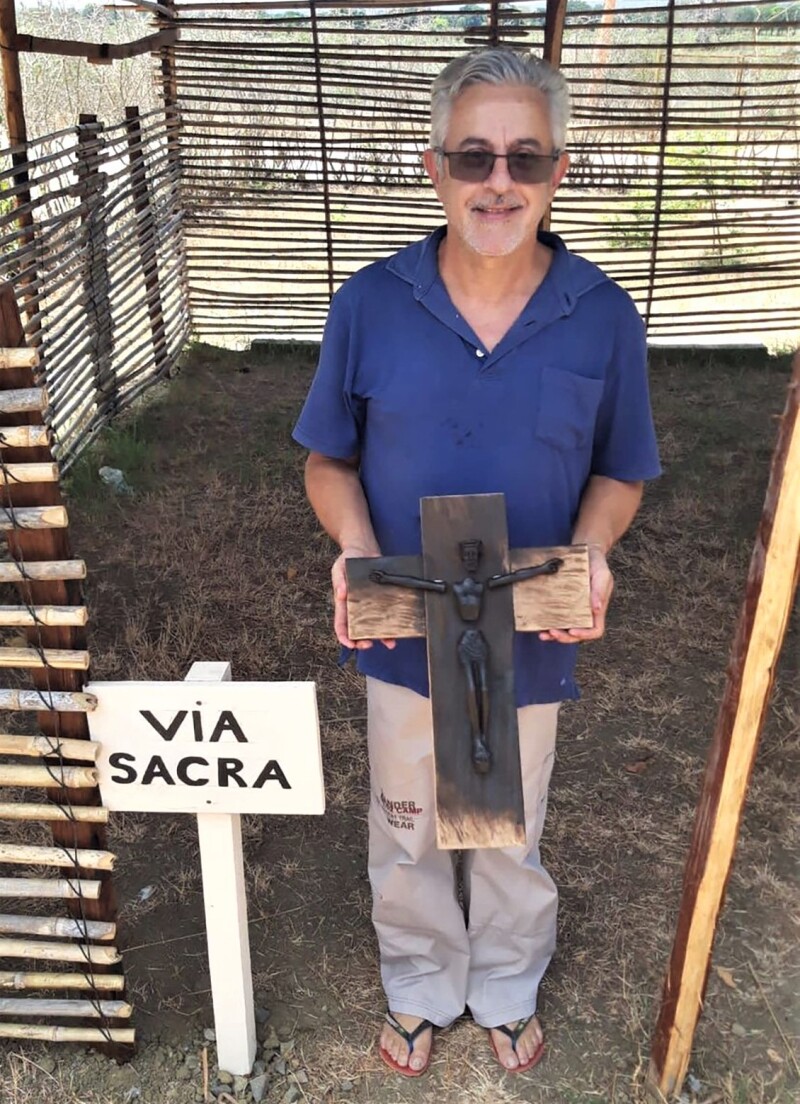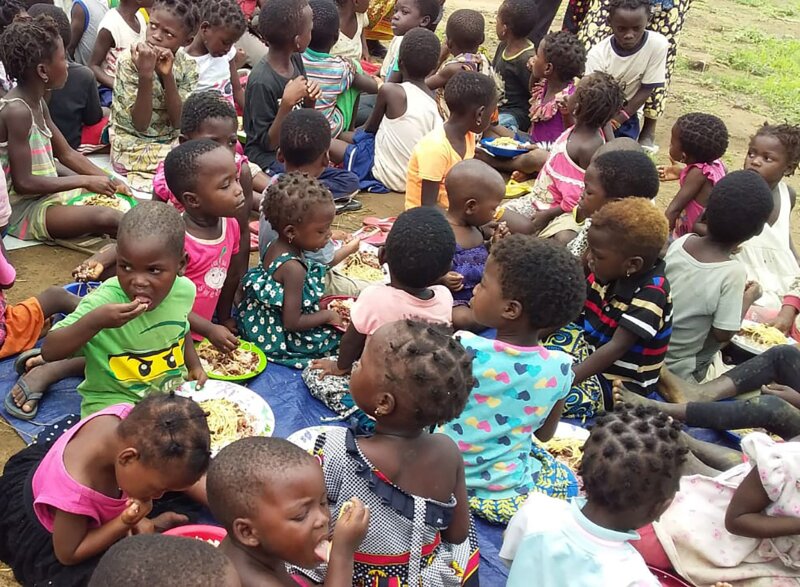
BISHOP IN CABO DELGADO: 'THE ATTACKS ON THE VILLAGES CONTINUE'
Eduardo Campos Lima/Catholic News Service Â
01/31/2022
MOZAMBIQUE — Mozambican President Filipe Nyusi has been traveling through areas affected by the war between the country's armed forces and guerrillas connected to the Islamic State. Although his message is one of optimism, the situation in Cabo Delgado, the most affected province in northern Mozambique, remains chaotic, according to civic organizations that work in the area.

sculpture, made with wooden pieces of a house owned by a
Christian family that was burned by terrorists, in a photo from
Mieze, Mozambique, Dec. 8, 2021.
CNS photo/courtesy Father Edegard Silva Jr.
A Human Rights Watch report released in mid-January said the humanitarian crisis in Cabo Delgado and neighboring provinces intensified in 2021, despite the military's efforts to defeat insurgents. Violent murders of civilians, many times involving decapitation, and kidnappings of women and children continue to occur.
The Catholic Church has been offering relief to the displaced and denouncing the injustices since the beginning of the crisis, in 2017. Most of those displaced live in temporary camps in precarious conditions.
But Bishop António Juliasse Sandramo of Pemba told Catholic News Service that the situation has fallen out of the news, so the diocese is receiving fewer donations.
"The world does not talk about Cabo Delgado anymore," he said. "At times, people say the situation is going back to normal, but it is not true. The attacks on the villages continue."
He said military progress forced the terrorists to leave the bases they had, and now "they have been assaulting more distant locations, whose residents end up fleeing."
"In many places we have an emergency, so we have been distributing food, clothes, and medicines to the displaced. In other regions, our challenge is to improve the conditions of the people living in the camps," Bishop Sandramo told CNS.
Brazilian-born LaSalette Father Edegard Silva Jr. is one of the missionaries currently assisting refugees — especially children — in Metuge district. He said many people have been living in tents, most of them made of braided grass.
"We are now in the rainy season, so it is very worrisome," he told CNS. He said the area had many problems, including a large number of children out of school.
Father Silva arrived in Muidumbe, a district in Cabo Delgado, in 2017, when the war had already started. At the end of 2019, one of the district's villages was attacked. In April 2020, he and his group had to leave the area. A few months later, the mission was entirely destroyed.
"The church, the community radio, the dental clinic, our kindergarten ... everything was burned by the terrorists," he recalled.

distributed by La Salette missionaries, Jan. 21, 2022. Some of
the children are refugees and others live in the village.
CNS photo/courtesy Father Edegard Silva Jr.
Months later, when he was relocated to Metuge to aid the refugees, Father Silva asked a Muidumbe resident to send him wooden pieces from one of the burned houses owned by a Christian family.
"I like to deal with symbols. I asked a local artist to make a sculpture of Christ in the cross, but one with the limbs detached from the torso. And we made a cross with the burned wood," he said. The 'Christ of Cabo Delgado,' as he named it, was put in a special area of the village, in order to represent the plight of so many Christians killed by terrorists with extreme cruelty.
The Diocese of Pemba also has been working to promote peace, Father Silva added. For instance, in early January, Catholic, Islamic and Protestant leaders released a joint declaration repudiating "terrorist and extremist acts" and reaffirming their commitment to "peace and fraternity."
The signers rejected the idea that the terrorists were connected to Islam and urged people to have a "frank and honest dialogue" to solve problems.
The statement was the result of an interfaith conference organized in December with more than 100 spiritual leaders.
"The idea was to reaffirm religious unity in Cabo Delgado," said Brazilian-born Sister Aparecida Queiroz, a member of the Daughters of Jesus. "All faiths live in peace here, and all of them are committed to work together for peace."
Christians and Muslims have established a plan that will include activities to empower people, especially the young, to reduce the possibilities of them joining the insurgents, Sister Queiroz said.
Bishop Sandramo confirmed that in Cabo Delgado, where the majority of the population is Muslim, the relationship among faiths has always been peaceful. The insurgents have not been able to change such reality, but their extremist speech and violent actions against Christians involved the manipulation of part of the Muslim bases in the region, he said.
"Now, the Catholic Church and the local Islamic associations showed clearly that Muslims do not have any relation with terrorism. We are working together to build ways for peace, speaking directly with the youth in our churches and mosques," he said.
-
